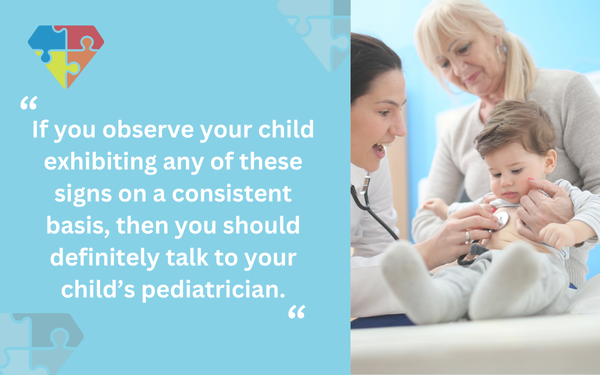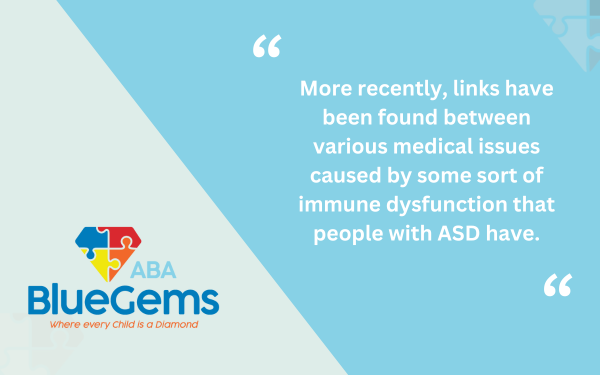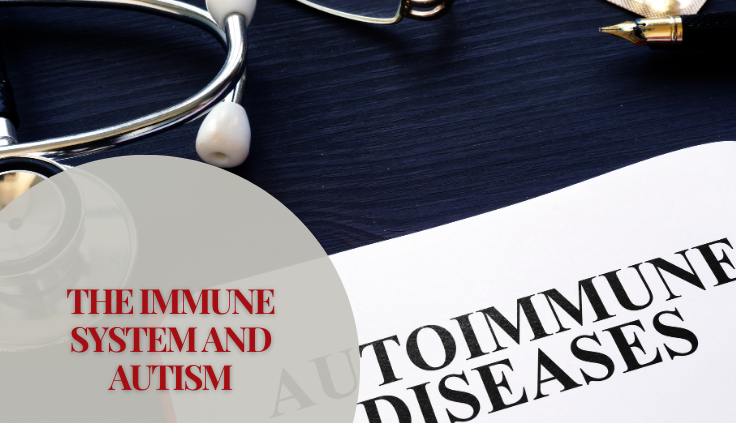The Immune System and Autism
Children with autism spectrum disorder (ASD) commonly face deficits with social interaction and communication. They also typically have restrictive interests, exhibit repetitive behaviors and/or experience sensory sensitivities.
Recent research has also shown that children on the autism spectrum are likely to suffer from immune system dysfunction. A study conducted in 2022, for example, found that children with ASD might have upregulated immune genes, which can commonly lead to inflammation in the brain.
Another study from that same year suggested that pregnant mothers with immune dysregulation may be at higher risk of having a child with autism. The metabolic stress and inflammation the mother experiences could result in abnormal signaling in the immune system as well as autoimmunity.
Below, we’ll dive deeper into the link between the immune system and autism, as well as how they both can be treated.
Table Of Contents
What is Immune System Dysfunction?
Immune system dysfunction, also referred to as immune disorder, happens when a person’s immune system doesn’t work the way that it should. This is a major concern, of course, because the immune system is the body’s defense system against harmful invaders such as viruses and infections.
If we didn’t have an immune system, viruses and bacteria would consistently get us sick. The immune system is a complex system composed of organs, tissues and special cells working together so you are protected.
There are many different immune system disorders, and they can be caused in a number of ways.
Some people are born with them, which is called a primary immune deficiency. Sometimes, a disease could weaken the immune system, which is referred to as acquired immune deficiency.
Some people have a too active immune system, which might happen during an allergic reaction. Others, still, might have an immune system that works against them, which is referred to as autoimmune disease.
What are Some of the Signs of an Immune System Disorder?
You can observe many signs that your child might have an immune system disorder. That’s why it’s always important to monitor your child and take a written record of their experiences.
This could include being sick more often than other children, not getting fevers to try to fight illnesses, having behavioral issues rather than the typical symptoms of being sick, experiences regression in skills, experiences an improvement of their ASD symptoms while they’re sick and doesn’t get sick even when other members of the house are sick.
If you observe your child exhibiting any of these signs on a consistent basis, then you should definitely talk to your child’s pediatrician.

What is the Link Between the Immune System and Autism?
Over the last 20 or so years, a lot of research has been conducted into the link between immune system disorders and autism.
Before ASD was even coined a term in 2013, one study suggested that autism should be considered an autoimmune disorder. The researchers made this suggestion based on the fact that they observed a high correspondence between people with autism and autoimmune disorders.

Another study conducted in 2009 proposed that an autoimmune mechanism for autism be created, which suggests that there were environmental triggers that might provoke faulty regulation in the immune system that then results in autoimmunity being sent to the brain.
More recently, links have been found between various medical issues caused by some sort of immune dysfunction that people with ASD have. Some of the most common ones include chronic infections or recurring acute infections, mast cell activation, EDS or hEDS, autoimmune encephalitis, PANDAS/PANS, and primary or secondary immunodeficiency.
How Can Immune System Disorders and Autism Be Treated?
Immune dysfunction and autism are in many ways treated differently, since the former is a medical issue while the latter is a behavioral one. That being said, there are some ways that ASD is treated that can also help support people who have co-occurring immune system disorders.
For example, applied behavior analysis (ABA therapy) seeks to identify some of the triggers to certain negative behaviors in children with autism — and that strategy can be effective for those with immune dysfunction as well. This could include avoiding environmental triggers such as certain fragrances, smoke, chemicals, mold and pollution.
Eating a healthy diet and paying particular attention to gut health can be very effective for people who suffer from both immune system disorders and autism. Eating a lot of vegetables and fruits, avoiding sugar as much as possible, maximizing the intake of antioxidants, eating anti-inflammatory foods, drinking a lot of filtered water, and potentially taking a prebiotic or probiotic all could help.
Blue Gems ABA Supports Children with Autism
Many children with ASD also suffer from immune system disorders. Unfortunately, this occurs in a lot of people on the autism spectrum, creating more challenges for these people as well as their family members and professionals who support them.
At Blue Gems ABA, we support children on the autism spectrum by administering ABA therapy. In doing so, we help them build the social, communication and daily life skills with which they typically struggle.
Many of the strategies we take as it relates to avoiding certain triggers and following a healthy diet also provide a lot of benefits to those children who suffer from an immune dysfunction.
To learn more, please contact us today.




